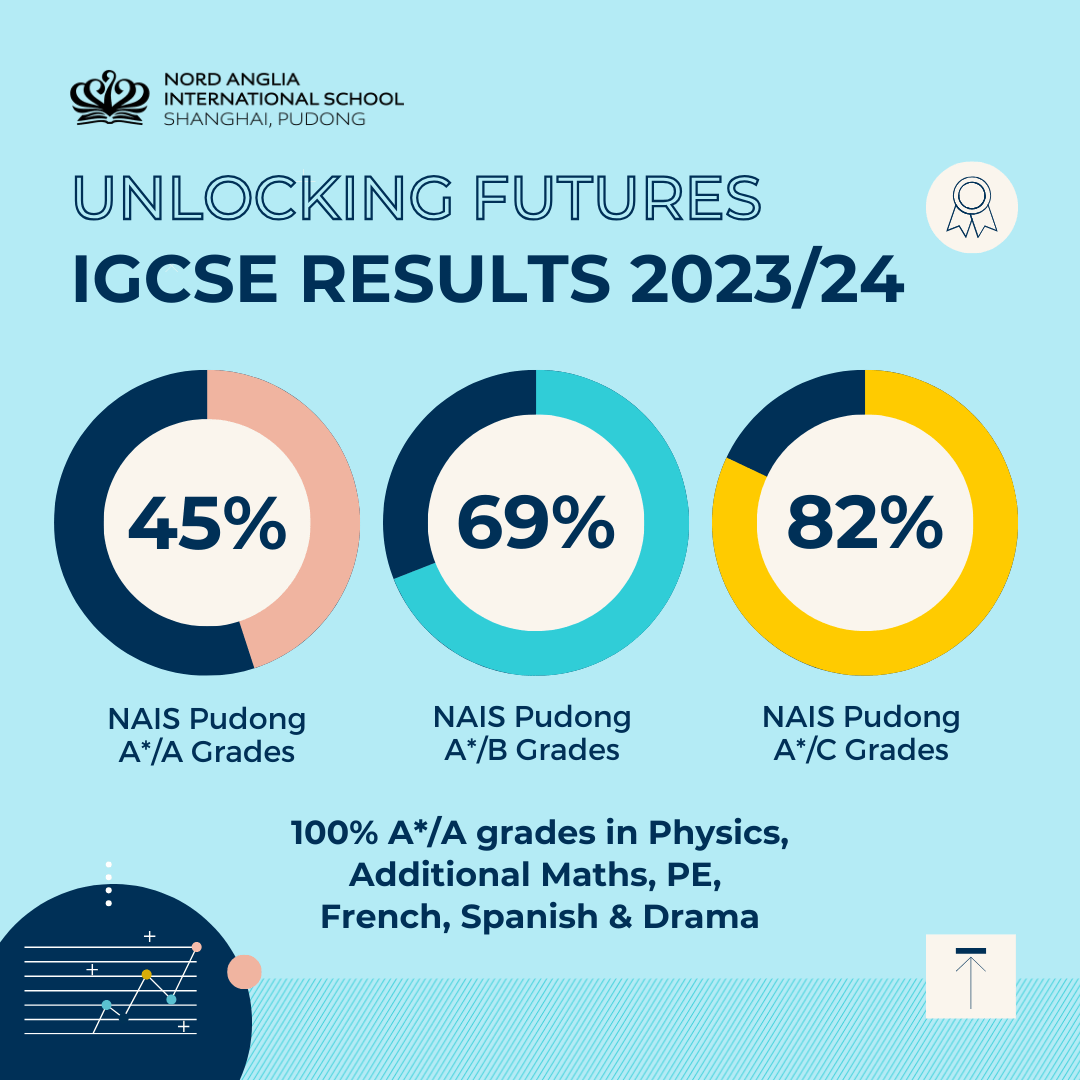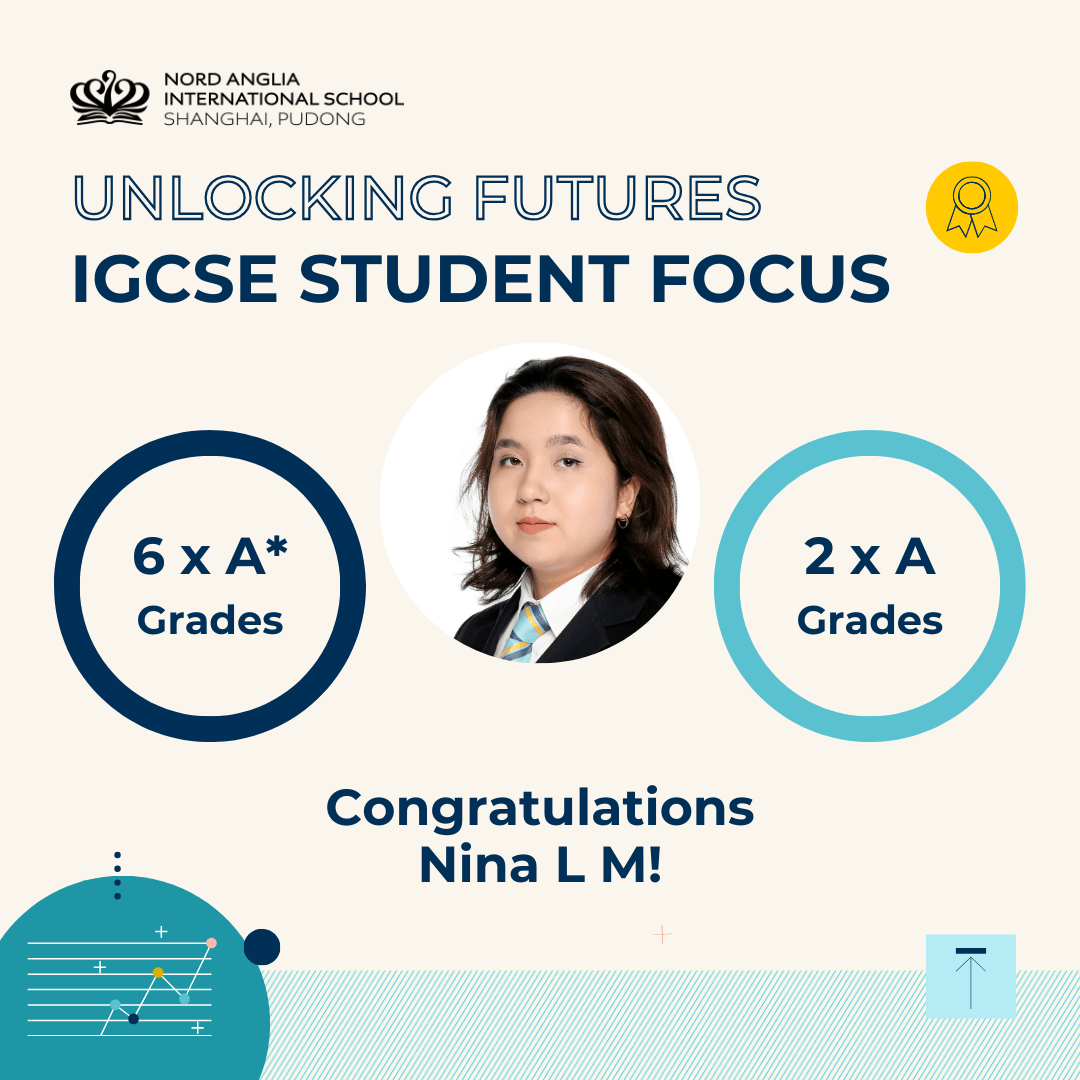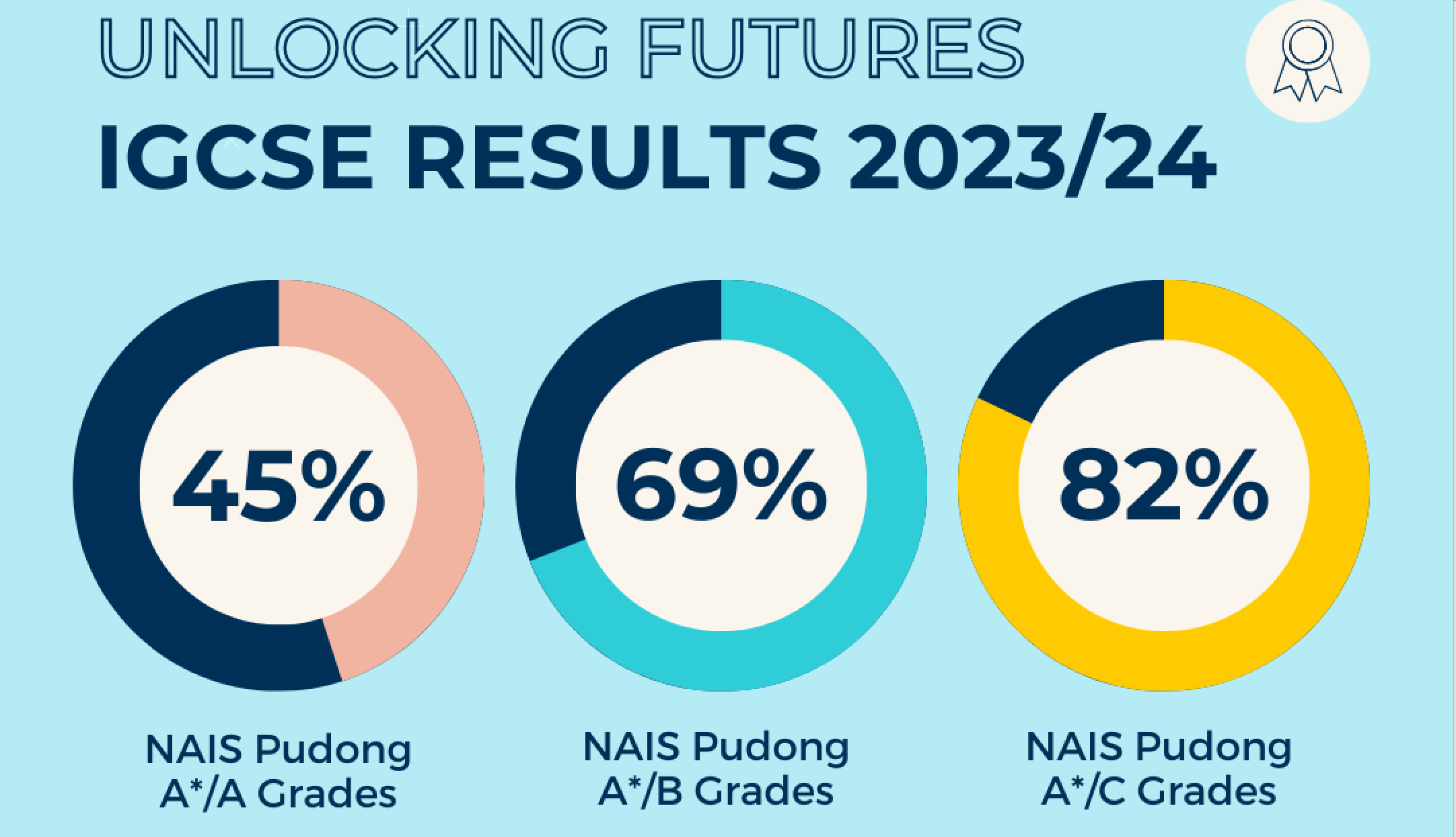Congratulations to our students on their outstanding IGCSE results! We are thrilled to share their achievements with you. Take a look at the chart below to see the impressive scores our students have earned.


Following her outstanding IGCSE results, stalwart NAIS Pudong and now Year 12 IB Diploma student, Nina L M, spoke to us about her journey with the school so far:
- Hi Nina, before we get started, can you tell me a little bit about yourself and your time at NAIS Pudong so far, including how long you’ve been at the school?
I joined NAIS Pudong in Year 3 - nine years ago now! I have loved the school since I arrived. I had some English language issues at start as English is not my mother tongue, but after my time at the school I’m now a fluent English speaker. I have so many memories of the school – it really does feel more like a home now. Although many of my teachers have moved onto new schools over the years, being in the school feels comforting to me, especially having spent more than half of my life here.

Nina’s first yearbook picture from Year 3
- You’ve just finished your IGCSEs and had your results - which were absolutely incredible - so congratulations! How did you find the overall experience in Year 10 and Year 11?
Year 10 was mostly adapting to the concept of self-supported study and putting in place study plans, which was fairly new to me after the structure of primary school and Key Stage 3. I had been used to lots of teacher support, but it was understandably different for IGCSE as we had to develop independence and self-motivation skills, especially linked to assignments and deadlines etc. For IGCSE I really felt like I stepped up, especially when taking part in knowledge checkpoints, which I was good at. I really found my own learning style, which was different to others but it worked for me. That came about after talks from our teachers (especially Mr Sykes) who spoke to us about developing certain study styles ahead of exams. While we given lots of great pointers, what worked for me was taking lots of notes, and re-writing them if needed. While that doesn’t work for everyone, it fits with my style.
In Year 11 I continued to update my learning style. In hindsight, it felt like a rushed year. I took Additional Maths, which meant a whole additional book to learn, and that really put into practice the self-supported learning element. It was difficult, but I got there in the end.
Learning style – Mr Sykes did presentation on them before exams – he told us that most efficient is to teach others. Somewhat correct for me, but he also said making notes not very memorable and doesn’t work for all, but that worked perfectly for me. I understand it doesn’t work for everyone. If I read them it doesn’t work, but re-writing again and again works.
- I’m sure you got some incredible support from your various subject teachers – are there any which stand out as being particularly helpful to you? And in what ways?
I got lots of great advice from Mr Sykes in Y10 (he was my Business Studies teacher then). He recommended that we review our learning after every class and topic if possible, and to make sure you fully understand things before moving on to next topic, and that is so true.
- What’s been your favourite subject so far, and why?
Biology and Maths for sure. I enjoyed Biology because I want to find out how the body and the world works and it has helped me a lot in my daily life. For example, if I have a cold, instead of just taking medication now, I understand better that medicine only treats symptoms and not the virus itself, so I can support myself in a more deliberate and meaningful way through that. It’s so cool when things just start to make more sense while you’re learning. For Maths, I like calculations and understanding the process behind getting answers to problems – it’s actually fun. I love that there are fixed answers in Maths – it provides precision and stability.
- Now you’ve started your IB Diploma journey, I’m sure you’ve got a busy two years ahead. Which subjects have you chosen to study at HL and SL?
For Higher Level I have chosen Mathematics, Biology, and English Language & Literature. For Standard Level, I am studying Chemistry, Economics and Mandarin. I’m nervous about it because even after a couple of days, I’m already starting to better understand the commitment needed at IB Diploma level, but we are getting support on time management and further developing our learning styles.
- Do you already a pathway for university planned out? If so, where are you hoping to go and what would you like to study at degree level?
Yes I have a clear goal – I hope to further study Natural Sciences in Genetic Engineering or Medicine. I’m likely to study in Europe, ideally at ETH in Switzerland or the Netherlands. I’ve had a good idea about this pathway for around four years now after a series of career talks and discussions.
- If you already have thoughts of career ahead of you, what might that be?
I really want to be involved in research so I can help develop something new for our society. It’s an complex pathway but I always like to aim high. Being a doctor feels natural to me. My uncle and many people in our family and friend circle are doctors, and I want to help people too. It really excites me to know more about the human body.
- You’ve been at NAIS Pudong since 2015 – do you have any special memories of the place so far? If so, tell us a little about them.
Actually, I distinctly remember when I reached Year 10 just how respectful all of the students were too each other – there was just an absence of bad characters (did you hide them all somewhere?) I know at that stage of school, there are usually cliques and unpleasantness sometimes, but here it was different and it’s left some wonderful memories of enjoying school as a result.
- For your fellow students just about to set out on their IGCSE journey in Year 10, do you have any advice for them related to studying or general approach to this specific stage of school?
I have two main bits of advice. 1: Revise really early, and revise throughout the year rather than just before exams. No matter how quick you think you understand a topic, there is never enough time at the end before exams to go through everything again. Revision directly before exams is really hard, so do the preparation work well in advance. I was doing multiple hours of revision every night ahead of the IGCSE exams and it wasn’t pleasant. And 2: Have fun! IGCSE study is generally an enjoyable time – you chose your subjects – so enjoy them as much as you can. Remember that if you don’t like a subject by the end of Year 11, you can drop it at IB Diploma level.
- And finally, for any families who are considering joining NAIS Pudong in future, what message would you give them, linked to your time at the school so far?
The small class sizes here really make the difference – they definitely help students who need extra time with teachers, who can tailor teaching to individual student needs. It’s very different to larger schools where much bigger classes can mean teachers don’t know every child, and can’t help them when it’s really needed.
A huge thank you to Nina for her time talking to us. We wish her - and all of our other Year 11 students - all the best at the start of their IB Diploma journey.









.jpg?rev=-1&hash=4B1ADA74AB0E829CB2ECEE6BEF89D006)